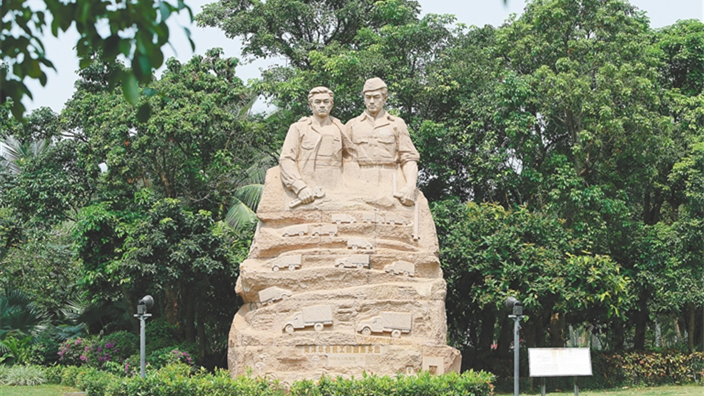By continuing to browser our site and use the services you agree to our use of cookies, Privacy Policy and Terms of Use. You can change your cookie settings through your browser.
Editor’s Note:
Over 3,200 overseas Chinese drivers and mechanics living in Southeast Asian countries were rallied by famous business pioneer and philanthropist Tan Kah Kee in 1939. From 1939 to 1942, these ‘Nanyang Volunteers’ transported 500,000 tons of military supplies and other needed items over the Yunnan-Myanmar Road (also known as Burma Road), a critical supply route, making invaluable contributions to victories in both the Chinese People’s War of Resistance Against Japanese Aggression and the World Anti-Fascist War. Over eight hundred ‘Nanyang Volunteers’ came from Hainan, and over 400 of them gave their lives on the Yunnan-Myanmar Road.
“As the saying goes, ‘Everyone has a duty toward his country’. I wanted to go back and fight against the Japanese aggression!” In 1939, Wu Huimin, a 21 year old overseas Chinese from Hainan was living in Singapore. He desperately wanted to join the ‘Nanyang Volunteers’ in order to support his motherland in the War of Resistance Against Japanese Aggression and ‘strive for a ray of hope’ for a nation in distress.
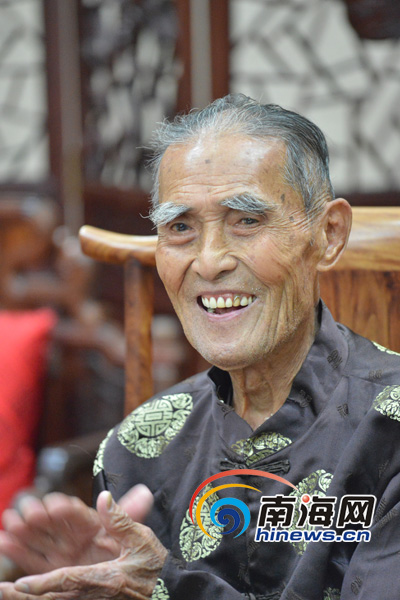
Wu Huimin in his later years. (Photo: Hinews)
Changing his name for his country
In 1918, Wu was born to an impoverished family in Jiuqiujiang, Zhongyuan Town, Qionghai. When he was only three years old, his father died, leaving his mother to raise him alone. To help Wu achieve success in life, when he was fifteen years old, his mother sold their only parcel of land and sent him to live with his uncle in Singapore. “My uncle was the director of the Nanyang Wu Clan Association. He brought me to the association to do odd jobs. I worked to earn money during the day and studied at night.”
In February of 1939, the Japanese Army invaded Hainan Island. Wu received a letter from his hometown saying that the Japanese invaders were forcing local young and middle-aged people to work building defensive structures, forts, and airports. “At the time, my uncle often took me to the Association to participate in resistance activities, and donated the money from charity sales to aid Chinese people in their fight against the Japanese invasion.” In 1938, Wu also participated in a demonstration held by overseas Chinese in Singapore.
In 1939, the Nanyang Federation of China Relief Fund led by Tan Kah Kee called on young Overseas Chinese drivers and engineers to return to China to form a ‘Nanyang Volunteer’ service group and join the national fight against the Japanese invasion. “I wanted to go back and fight the Japanese, but my uncle didn’t want me to go,” said Wu. “My original name was Wu Zhongbiao, but I changed it to Wu Huimin. I also changed my age and registered secretly without telling my uncle.” Young Overseas Chinese with driving skills were being recruited, but Wu didn’t know how to drive. “I was so anxious! I was afraid I wouldn’t be able to go back to China.” He immediately rented a car and began practicing both driving and auto repair. After a week, he had learned to drive, and finally returned to China.
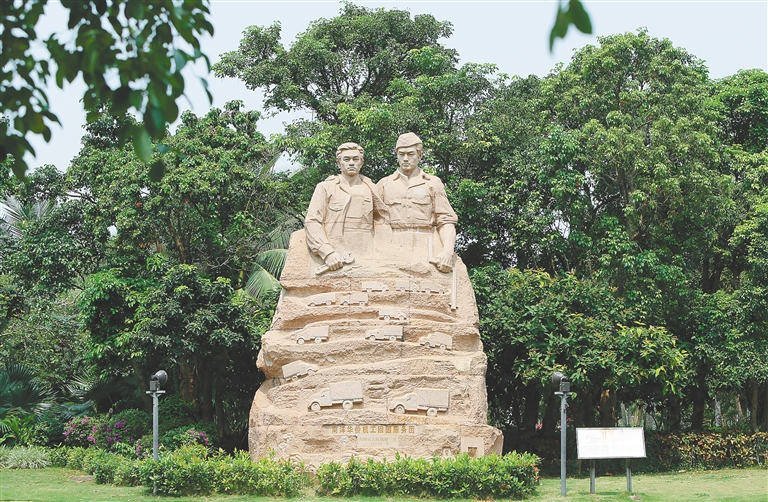
A sculpture of the ‘Nanyang Volunteers’ in the Haikou Youth Activity Center Square. (Photo: Hainan Daily)
“I was part of the ninth group of mechanics, and we returned to China on Aug. 14, 1939. At that time, there were hundreds of people leaving Singapore on the ship.” On the deck, they all sang popular songs of the time such as “Farewell to Nanyang (《告别南洋》)” and “March of the Volunteers (《义勇军进行曲》)” (China's national anthem) together. Wu recalls being assigned to the Southwest Transportation Station upon arrival in Kunming. In addition to transporting arms and medicines to soldiers on the front lines, the mechanics were also responsible for repairing vehicles.
“Returning to China for the War was unforgettable”
The terrain along the Yunnan-Myanmar Road is rugged, with high cliffs, steep grades, and sharp turns, posing huge transportation problems. “I once saw a vehicle transporting gasoline flip over a cliff because its wheels slipped on a sharp turn. It rolled over about ten times before it hit the bottom. Once I slammed on the brakes and the car almost went over the edge. Luckily, there was a dirt berm. When I got out, I saw that most of the front of the vehicle was hanging over the edge of the cliff. I was so scared that I broke out in a cold sweat.”
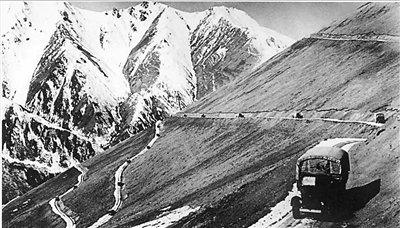
The Yunnan-Myanmar Road was a very basic road in urgent need of repair. The terrain was dangerous and road conditions extremely poor. (Photo: Hainan Daily)
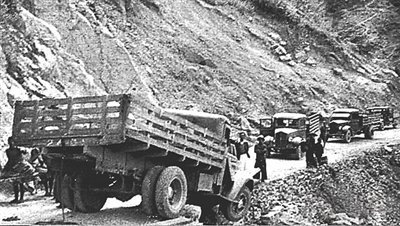
The poor conditions on the Yunnan-Myanmar Road led to a high number of accidents. (Photo: Hainan Daily)
"During transportation runs, Japanese planes would circle overhead and drop bombs on any vehicles they saw. Many drivers tragically died that way." Wu sighed as he remembered. “Many mechanics died of disease. There was malaria and a lot of disease carrying mosquitoes in the mountains between western Yunnan to northern Myanmar. Many mechanics were bitten by mosquitoes and contracted malaria with chills and fever. Since there was a lack of medical care and medicines, many of them could only wait to die.”
In 1940, after Wu completed his brief transport mission on the Yunnan-Myanmar Road, he was posted to the Chongching Machinery Manufacturing Factory as a mechanic and driver, and was later a recommended Huangpu (Whampoa) Military Academy applicant. After 1945, he returned to Hainan to live as a farmer.
On January 8, 2016, Wu Huimin passed away due to illness at the age of 98. He lived a life of poverty, and his only treasure was a pair of old-fashioned red leather shoes he had polished to a shine. He wore these shoes when he returned to China with the ‘Nanyang Volunteers’. In Wu’s drawer, were also several valued photos and certificates. Wu once said: "The life and death experiences I had with my comrades during the Chinese People’s War of Resistance Against Japanese Aggression and my strong patriotic feelings are the most unforgettable part of my life.”
Embracing Zheng He’s Spirit as Gift of Harmony Project Launched
08:19, 13-July-2025Wu Huimin: A Nanyang Volunteer who gave up his name for his country
08:19, 13-July-2025Hainan Sees Huge Surge in Intl. Travel in First Half of 2025
08:19, 13-July-2025Poll: Diversity of civilizations drives human progress
08:19, 13-July-2025China's Xixia Imperial Tombs inscribed as UNESCO World Heritage Site
08:19, 13-July-2025Embracing Zheng He’s Spirit as Gift of Harmony Project Launched
08:19, 13-July-2025By continuing to browser our site and use the services you agree to our use of cookies, Privacy Policy and Terms of Use. You can change your cookie settings through your browser.

